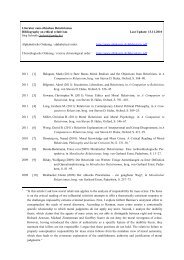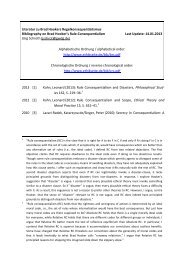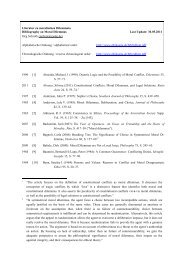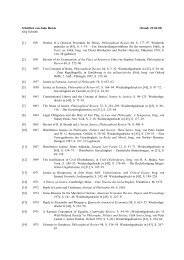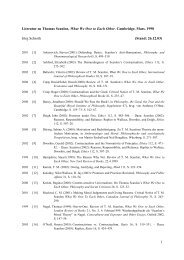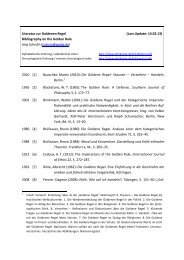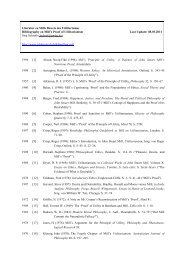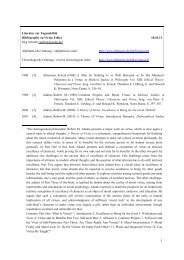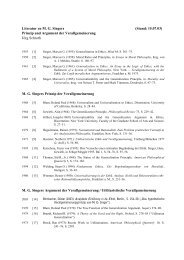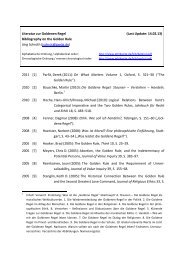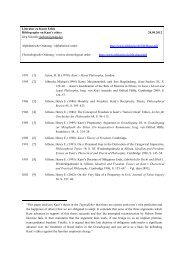Chronologische - Ethikseite
Chronologische - Ethikseite
Chronologische - Ethikseite
Create successful ePaper yourself
Turn your PDF publications into a flip-book with our unique Google optimized e-Paper software.
2008 [219] Morrisson, Iain P. D. (2008): Kant and the Role of Pleasure in Moral Action, Athens, OH. 58<br />
2008 [220] Moyar, Dean (2008): Practical Apperception: Self-Imputation and Moral Judgment, in Recht<br />
und Frieden in der Philosophie Kants. Akten des X. Internationalen Kant-Kongresses,<br />
Band 3: Sektionen III–IV, hrsg. von Valerio Rohden, Ricarda R. Terra, Guido A. de<br />
Almeida und Margit Ruffing, Berlin, S. 281–90.<br />
2008 [221] Moyar, Dean (2008): Unstable Autonomy: Conscience and Judgment in Kant’s Moral<br />
Philosophy, Journal of Moral Philosophy 5, S. 327–60. 59<br />
2008 [222] Muchnik, Pablo (2008): Kant on the Sources of Evil, in Recht und Frieden in der Philosophie<br />
Kants. Akten des X. Internationalen Kant-Kongresses, Band 3: Sektionen III–IV, hrsg.<br />
von Valerio Rohden, Ricarda R. Terra, Guido A. de Almeida und Margit Ruffing,<br />
Berlin, S. 291–301.<br />
2008 [223] Nahra, Cinara (2008): Acting from the Motive of Duty and the Incorruptible Ideal Moral<br />
Agent, in Recht und Frieden in der Philosophie Kants. Akten des X. Internationalen<br />
Kant-Kongresses, Band 3: Sektionen III–IV, hrsg. von Valerio Rohden, Ricarda R.<br />
Terra, Guido A. de Almeida und Margit Ruffing, Berlin, S. 303–11.<br />
2008 [224] Nelson, William (2008): Kant’s Formula of Humanity, Mind 117, S. 85–106. 60<br />
duty superior to acting from love and sympathetic feelings, but the cold-heartedness found in Kant’s<br />
examples should be thought of as a virtue rather than a vice.”<br />
58 “Kant scholars since the early nineteenth century have disagreed about how to interpret his theory of moral<br />
motivation. Kant tells us that the feeling of respect is the incentive to moral action, but he is notoriously<br />
ambiguous on the question of what exactly this means. In Kant and the Role of Pleasure in Moral Action,<br />
Iain Morrisson offers a new view on Kant’s theory of moral action.<br />
In a clear, straightforward style, Morrisson responds to the ongoing interpretive stalemate by taking an<br />
original approach to the problem. Whereas previous commentators have attempted to understand Kant’s<br />
feeling of respect by studying the relevant textual evidence in isolation, Morrisson illuminates this evidence<br />
by determining what Kant’s more general theory of action commits him to regarding moral action. After<br />
looking at how Kant’s treatment of desire and feeling can be reconciled with his famous account of free<br />
maxim-based action, Morrisson argues that respect moves us to moral action in a way that is structurally<br />
parallel to the way in which nonmoral pleasure motivates nonmoral action.<br />
In reconstructing a unified theory of action in Kant, Morrisson integrates a number of distinct elements in<br />
his practical philosophy. Kant and the Role of Pleasure in Moral Action is part of a new wave of interest in<br />
Kant’s anthropological (that is, psychological) works.” (Publisher’s (Ohio University Press) description)<br />
59 “In this paper I argue that Kant’s claims about conscience in his moral writings of the 1790s reveal a<br />
fundamental instability in his moral philosophy. The central issue is the relationship between the moral law<br />
as the form of universality and the judgment of individuals about specific cases. Against Thomas Hill’s<br />
claim that Kant has only a limited role for conscience, I argue that conscience has a comprehensive role in<br />
Kantian deliberation. I unpack the claims about conscience in the Metaphysics of Morals to show that they<br />
describe conscience as both a basic act of self-consciousness and as an all-things-considered judgment. I<br />
outline the role of conscience in moral motivation, and argue that taken together Kant’s writings about<br />
conscience reveal a way to rethink Kant’s conception of the Fact of Reason.”<br />
60 “This paper is concerned with the normative content of Kant’s formula of humanity (FH). More specifically,<br />
does FH, as some seem to think, imply the specific and rigid prescriptions in ‘standard’ deontological<br />
theories? To this latter question, I argue, the answer is ‘no’. I propose reading FH largely through the



